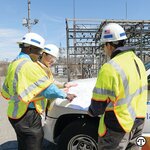

(NAPSI)—Addressing climate change is an all-hands-on-deck undertaking. It requires a smarter, stronger, and cleaner energy grid that provides affordable, reliable power when and where people need it. The grid of the future will have to be at least twice the size of what it is today—most likely even bigger.
That means jobs—thousands and thousands of them across a wide variety of industries, from manufacturing technology, such as batteries and wind turbines, to electric vehicle construction and maintenance to consumer sales. The impacts on the workforce across the state and nation, and the economic effects on local communities, will be significant.
According to a 2023 U.S. Department of Energy (USDOE) employment study, the energy workforce grew by nearly 300,000 jobs over the previous year—a faster rate than the overall U.S. workforce. Clean energy jobs specifically grew by 114,000, with every state seeing growth.
These new jobs present an opportunity to diversify the energy workforce and can open doors to individuals who might not have previously considered the sector for a career. Women made up more than half of the energy jobs added last year, according to USDOE, and veteran employment outpaced that of the overall U.S. economy.
Examples of jobs necessary for a successful clean energy transition include:
•Offshore wind farm servicers
•Renewable energy engineers
•Solar panel installers and technicians
•Solar sales representatives
•EV production technicians
•EV charging station maintenance technicians
•Sustainable construction workers
•Robotics maintenance workers
The federal government offers a wealth of clean energy workforce development assistance. That includes a Clean Energy Corps with opportunities for engineers, attorneys, public policy specialists and other professionals, as well as career mapping tools that help people understand the roles available across energy sectors and their skills requirements.
Massachusetts is seventh in the nation for clean energy jobs, according to national business group E2. Resources such as the Massachusetts Clean Energy Center, which estimates the need for an additional 29,700 full-time workers to meet near-term state climate goals, are available to help link skilled workers with Bay State-based clean energy jobs.
And as a more robust, resilient, and reliable grid grows to enable more electrification and renewable energy, utilities including National Grid have a key role to play in creating economic opportunities for the people who will help the state achieve its ambitious climate change goals.
National Grid’s Future Grid plan is expected to spur the creation of 12,600 new jobs, generate $1.6 billion of incremental economic output across the Commonwealth by 2035. Other benefits in the same time frame include 492,000 more electric vehicles and 84,000 more electric heat pumps.
A Workforce Development Pilot program, which includes four training academies targeting all age groups and skill levels, supports this work. That includes academies to engage:
•Work-ready adults ready to reenter the workforce by providing immersive upskilling and training in high-demand, high-value energy and utilities skills;
•College and university graduates starting their careers by providing professional development and creating connections that can lead to internships, co-ops, and full-time employment in the energy and utilities sector; and
•High school and middle school students by providing hands-on opportunities to explore energy and utility careers, take part in professional development, and promote STEM awareness of the Commonwealth’s climate and clean energy.
Ultimately, with the right workforce in place, Massachusetts—and the nation—can make major strides in tackling the climate crisis and providing an equitable, economically viable, and reliable energy future.
“The clean energy transition represents an enormous opportunity to cultivate a new generation of workers,” said Amanda Downey, vice president for strategy development and partnerships at National Grid New England. “To ensure an equitable and accessible transition, we need to we reach as many people as possible with training and education programs that build critical skills. That’s how we’ll create new economic opportunities and mobility for Bay Staters and set ourselves up for significant progress toward our climate goals.”
Learn More
For further facts, visit gridhome.nationalgrid.com/news/169224/reflecting-on-a-successful-workforce-development-summer and gridhome.nationalgrid.com/news/177027/training-tomorrow-s-leaders-today.